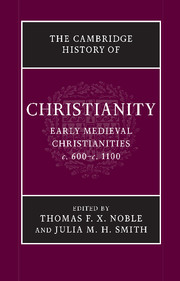Book contents
- Frontmatter
- Introduction: Christendom, c. 600
- Part I Foundations: Peoples, Places, and Traditions
- Part II Christianity in Confrontation
- Part III Christianity in the Social and Political Order
- 12 The Christian church as an institution
- 13 Asceticism and its institutions
- 14 Law and its applications
- 15 The problems of property
- 16 Ideas and applications of reform
- 17 Churches in the landscape
- Part IV Christianity as Lived Experience
- Part V Christianity: Books and Ideas
- Conclusion: Christendom, c. 1100
- Bibliographies
- Index
- References
12 - The Christian church as an institution
from Part III - Christianity in the Social and Political Order
Published online by Cambridge University Press: 28 March 2010
- Frontmatter
- Introduction: Christendom, c. 600
- Part I Foundations: Peoples, Places, and Traditions
- Part II Christianity in Confrontation
- Part III Christianity in the Social and Political Order
- 12 The Christian church as an institution
- 13 Asceticism and its institutions
- 14 Law and its applications
- 15 The problems of property
- 16 Ideas and applications of reform
- 17 Churches in the landscape
- Part IV Christianity as Lived Experience
- Part V Christianity: Books and Ideas
- Conclusion: Christendom, c. 1100
- Bibliographies
- Index
- References
Summary
We live in a post-ecclesiastical world. Popular and scholarly surveys repeatedly confirm that fewer and fewer people possess strong feelings of identity with specific ecclesial bodies. As the majority of studies in this volume demonstrates, medievalists have in recent decades exchanged an almost exclusive focus on institutions and high theology for new foci on ordinary people and lived experience. Nevertheless, in the Middle Ages, Christianity was inseparable from the institutional frameworks through which Christianity spread and functioned.
This chapter, which stretches in summary fashion from Ireland to Mesopotamia, will pursue three lines of inquiry in an attempt to form a sense of the church as an institutional reality. First, we shall look at the ebb and flow of institutional existence itself as new ecclesiastical hierarchies were created while others were disrupted or even disappeared. Second, we shall explore, by means of some illustrative examples, how the institutional church actually functioned. Third, we shall ask how the church thought about itself as an institution by taking some soundings in the complementary fields of ecclesiology and institutional identity. In other words, we shall see how common understandings of structure, office, law, and ideas transcended time and place.
- Type
- Chapter
- Information
- The Cambridge History of Christianity , pp. 247 - 274Publisher: Cambridge University PressPrint publication year: 2008
References
- 1
- Cited by

